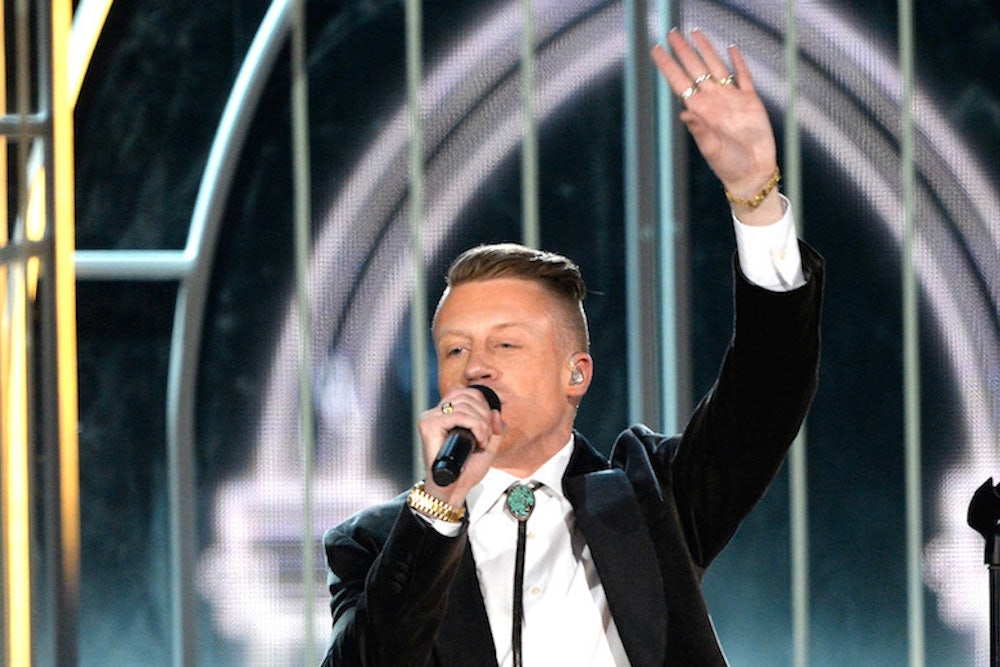“And I can’t change even if I tried, even if I wanted to," goes the chorus of Macklemore and Ryan Lewis's Grammy-nominated "Same Love," which the duo performed at Sunday's ceremony while Queen Latifah officiated the marriage of 33 straight and same-sex couples. A seven-minute plea for tolerance (namely in politics and hip hop), the track has ousted Gaga’s "Born This Way" as pop music's premiere Gay Battle Cry, rightly condemning "right wing conservatives [who] think it's a decision, and you can be cured with some treatment and religion." But the chorus bugs me. By its logic, none of us has any control over our sexual identities. We are what we are, and there’s not a damn thing we can do about that, so let’s just stop trying to change.
That's wrong. It’s time for the LGBT community to stop fearing the word “choice,” and to reclaim the dignity of sexual autonomy.
The aversion to that word in our community stems from belief that if we can’t prove that our gayness is biologically determined, then we won’t have grounds to demand equality. I think this fear needs to be addressed and given up. In America, we have the freedom to be as well as to choose to be. I see no reason to believe that the only sexualities worth protecting are the ones over which one has no control. After all, isn’t trans activism fueled by the belief that the government has the responsibility to protect all of us regardless of our sexual choices? And aren’t protections for bisexuals based upon the same presupposition of sexual autonomy? Perhaps the L and G factions of our community would do well to follow the political lead of the Bs and Ts on this issue.
One of the reasons I think our activism is so insistent on sexual rigidity is because, in our push to make gay rights the new black rights, we’ve conflated the two issues. The result is that we’ve decided that skin color is the same thing as sexual behavior. I don’t think this is true. When we conflate race and sexuality, we overlook how fluid we are learning our sexualities truly are. To say it rather crassly: I’ve convinced a few men to try out my sexuality, but I’ve never managed to get them to try on my skin color. In other words, one’s sexuality isn’t as biologically determined as race. Many people do feel as if their sexuality is something they were born with, and I have no reason to disbelieve them. But as I and other queer persons will readily confirm, there are other factors informing our sexualities than simply our genetic codes.
Part of what it means to be human is to be adaptable and elastic, to try on new identities, to try new experiences, to play with the paradigm, to bend the norm to its snapping point and see if it cracks under the pressure of its own linguistic limitations. The re-inventiveness of our human condition is one of our greatest traits, and it’s worth protecting both legally and philosophically. I wonder how our LGBT discourses would be enhanced were we to fully embrace the dynamism of our sexuality. I imagine we’d begin to open up our stale conversations by complicating the predictable, sensational narratives reflected in the shrill headlines of the day.
Arguing that gayness is as genetically fixed as race might have bolstered our rhetoric a few years ago, but is it necessary to argue that way now? I understand that the genetic argument for homosexuality is a direct response to the tired “You weren’t born that way” rhetoric of religious people. But in my opinion, we could strip that religious argument of much of its power if we responded like this: “Maybe I wasn’t born this way. Now tell me why you think that matters.” I imagine many religious people haven’t really thought through the implications of their own rhetoric. (What, for instance, does a socially-constructed word like “natural” even mean?)
We’re at a very exciting time in history when it comes to LGBT equality. Yes, there are setbacks almost daily in America—to say nothing of Uganda and Russia, two countries that demand our immediate attention. But here in America, we are edging ever closer to post-equality. With that in mind, should we continue to believe that people will only accept our gayness if they are made to believe we didn’t choose it? Should reluctant, obligatory acceptance be the goal of our activism? Well, that certainly isn’t my goal.
Whenever someone accepts me merely because she feels obligated to do so by my genetic code, I feel degraded rather than empowered. It's like saying, “You can’t help it, sugar. You were born this way. Me? I was born with astigmatism and a wonky knee. We can’t change our limitations even if we wanted to.” (As if homosexuality was taken out of the DSM only to be written into the ADA.) In a way, this sentiment of obligation comes through in Macklemore’s "Same Love," a song I enjoy nonetheless. And insofar as it encourages many straight and gay people alike to be open to nontraditional forms of love, I hope he keeps singing it for many years to come.
Still, whenever the song shuffles across my iPod, I can’t help wondering whether Macklemore would have thought I deserved a song even if I told him that I could, in fact, change this if I tried, if I wanted to. I chose this.
